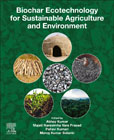
Biochar Ecotechnology for Sustainable Agriculture and Environment
Kumar Singh, Abhay
Vara Prasad, Majeti Narasimha
Kumari, Pallavi
Solanki, Manoj Kumar
Biochar Ecotechnology for Sustainable Agriculture and Environment summarizes current accomplishments in biochar ecotechnologies for enhancing agricultural production, encouraging sustainable waste management, and fostering a circular bioeconomy by advancing the pyrolysis process at both large-scale industrial and small-scale-local levels. This book will also address various topics and issues raised by the United Nations Sustainable Development Goals that are critical to include in efforts to advance agrotechnology, sustainability, and environmental protection, such as decarbonization through biochar production and its application for soil carbon management and sequestration in combating global warming effects, boosting circular bioeconomy through the bio-waste management, and biochar or biochar-based fertilizer for increasing soil fertility and food production. The chapters in this book will synthesize recent breakthroughs in biochar agro-ecotechnologies for increasing agricultural productivity and promoting circular bioeconomy by advancing the pyrolysis process and add mechanisms involved in biochar-fertilizer mediated in-soil biogeochemical cycle and nutrients retention, availability and their losses, soil-microbial responses, emission of greenhouse gases, and plant responses. Finally, this book aims to increase research understanding of nanotechnological breakthroughs in the production of biochar-based slow-release fertilizers, including their Nano characteristics involved in increasing fertilizer usage efficiency and managing chemical losses, for sustainable agriculture and the environment. Describes the benefits of biochar in uplifting circular bioeconomy through sustainable waste management practicesDiscusses cutting-edge approaches for investigating biochar, plant, and environment interactions, including the use of biochar to improve soil fertility, biological functioning, and plant responsesSummarizes nanotechnological breakthroughs in the synthesis and qualities of producing biochar-based slow-release fertilizer via pre and post-pyrolysis changes, as well as their importance in agriculture and the environmentProvide a grasp of the Nano characteristics of biochar that are engaged in boosting fertilizer usage efficiency and managing chemical losses INDICE: A. Biochar for waste management, circular economy, & carbon neutrality1. Biochar production to support circular bioeconomy: From waste biomass to a valuable product2. Returning agri-waste to cropland through biochar production: A sustainable practical solution for managing solid wastes3. Biochar production towards carbon neutrality: A practical application4. Integrated approach for achieving carbon neutrality through biochar industrial applicationB. Biochar production: Techniques & process5. Technological development of designing the pyrolysis devices for industrial scale biochar production6. Designing pyrolysis reactors and technology for producing low-cost biochar for farm-scale implementation7. A promising technological development for affordable, sustainable, and small-scale commercial biochar production in agrarian countries8. Factor’s influencing biochar properties and their relationship paradigm with the soil applicationC. Biochar for enhancing soil fertility, functioning, & plant responses9. Recent trends in multifarious benefits of biochar application to soil10. Stability and reactivity of biochar in regulating nutrient dynamics and its supplies in agricultural ecosystems11. Biochar’s prospects and implications on soil fertility, crop growth, physiology, and productivity12. Biochar augmentation on soil biotic process and microbial structure and functions in fertilized tropical croplandD. Biochar’s role in biogeochemical cycles & soil microbiology13. Recent advances in biochar implications on the biogeochemical cycles14. Biochar soil application for sustainable carbon sequestration and greenhouse gas mitigation15. Biochar’s role in the distribution, transformation, and budget of nitrogen in the fertilized cropland16. Biochar’s role in influencing microbial community dynamics and functional genes related to nitrogen cycle homeostasis17. Biochar-mediated regulation of reactive nitrogen compounds and the functional microbial community in soil: Emission and leaching lossesE. Nanotechnological approach for developing biochar-fertilizer18.Engineered biochar-mineral complex as a slow-release fertilizer19. Nanotechnological aspects in producing biochar-mineral fertilizer for sustainable and intensive agricultural production: Pre-or Post-pyrolysis biochar modification20. Functional tuning of mineral-enriched biocharfertilizer for enhanced performance, rhizospheric soil functioning, and plant/crop improvement21. Nanostructural, chemical, and functional attributes of biochar-minerals composites regulating fertilizer use efficiency and chemical leaching losses
- ISBN: 978-0-443-29855-4
- Editorial: Elsevier
- Encuadernacion: Rústica
- Páginas: 430
- Fecha Publicación: 01/02/2025
- Nº Volúmenes: 1
- Idioma: Inglés
